Turkish Journal of Traumatic Stress: A Call at the Beginning of the Journey
Turkish Journal of Traumatic Stress: A Call at the Beginning of the Journey
DOI:
https://doi.org/10.63175/tjts.15Keywords:
Turkish Journal of Traumatic Stress, Journal, Trauma, PTSD, Editorial, Traumatic StressAbstract
Throughout history, individuals and societies have faced traumatic experiences such as wars, natural disasters, fires, forced migrations, economic crises, and distressing events. These experiences have profoundly impacted individual and collective life, creating a multidisciplinary process with psychological, biological, and social dimensions. 1,2,3 Today, the evolving perspective on the impacts of trauma has fostered a new awareness regarding the importance of healing these effects and providing sustainable mental health services. 4 However, it is not yet possible to assert that the number of scientific studies and the accumulation of data in this field are sufficient. This gap represents a significant limitation, responsibilities, and challenges for researchers and clinicians working on psychological trauma. 5
Psychological trauma has a wide range of effects, from individual psychology to social memory and sociological dynamics. While it leaves deep marks on individuals, it can also shape the social structure and collective consciousness of societies. Therefore, scientific research is of great importance in understanding the biological, psychological and sociological dimensions of trauma and contributing to healing processes. The neurobiological basis, epigenetic mechanisms, and psychosocial effects of traumatic stress are among the most important research topics in psychiatry, psychology, and neuroscience today. 5 In this context, trauma-focused therapies, pharmacological interventions, psychoeducation programs, and psychosocial support approaches form the basis of trauma research on treatment processes. 7 Additionally, systematic documentation of cases, collection of epidemiological data, identification of risk factors, and evaluation of treatment efficacy will contribute significantly to both national and international literature. 4 The Turkish Journal of Traumatic Stress aims to contribute to this process and serve as a reference source for professionals working in the field of trauma.
The prevalence of traumatic processes in Turkey, as well as all over the world, brings responsibilities and challenges for professionals working in this field, as well as the opportunity to understand those affected by trauma, to learn about trauma, and ultimately to help those affected by trauma recover. In this context, we are thrilled to launch the Turkish Journal of Traumatic Stress as a publication platform focusing on the scientific foundations, treatment approaches, and societal dimensions of trauma. Our journal aims to bring together theoretical, clinical, and experimental studies on trauma and traumatic stress, contributing to both national and international literature. As the first academic journal in this field in Turkey, we are committed to creating a reliable scientific platform for academics and clinicians working on trauma. With our inaugural issue, we emphasize that this journey is not merely an academic endeavour but also a responsibility to guide the treatment of individuals affected by trauma—rebuilding trust, making sense of traumatic experiences, and reconnecting individuals with life. 1,6
The Turkish Journal of Traumatic Stress will publish not only theoretical studies but also clinical research, randomized controlled trials, case reports, systematic reviews, and meta-analyses. Key focus areas include examining the efficacy of psychological trauma and traumatic stress-related disorders treatment methods, developing new treatment protocols, evaluating post-trauma recovery processes, and identifying protective factors.5 We also aim to provide a platform for sharing current research and scientific advancements in the field of psychological trauma and traumatic stress.
As we embark on this journey, we emphasize the value of all scientific work in the field of traumatic stress. Documenting cases, conducting rigorous research, and sharing findings are crucial for the future of traumatic stress and related disorders treatment. As the Turkish Journal of Traumatic Stress, we invite all our colleagues to join us in this academic endeavor and contribute to this collective effort.
The articles featured in our inaugural issue contribute to unravelling the complex nature of trauma, highlighting the long-term effects of childhood trauma, and offering guidance on treatment approaches. We extend our gratitude to everyone who has joined us in this new journey and invite further contributions to the academic literature. Moreover, we remind our readers that our journal aims not only to provide academic knowledge but also to serve as a source of hope. Each article should resonate like a song on the path to healing; every finding should contribute to the effort of reconstructing lost meaning. Because we believe that trauma treatment begins with respecting, listening to, and understanding the individual's story, not just techniques.
We are at the beginning of this journey. Like every beginning, we carry great excitement and responsibility. As we follow the traces of traumatic stress, we will walk together toward the light of healing. Because we know that no matter how deep the trauma, the power of solidarity, scientific effort, and academic knowledge is always greater.
References
1. Herman JL. Trauma and recovery: The aftermath of violence--from domestic abuse to political terror. Hachette uK; 2015.
2. Van der Kolk B. The body keeps the score: Brain, mind, and body in the healing of trauma. Penguin Books; 2014.
3. Gündoğmuş İ, Ünsal C, Alma L, Par AJJoA, Maltreatment, Trauma. Psychometric properties of the turkish version of the international trauma questionnaire. 2023;32(12):1847-1865.
4. Association AP. Diagnostic and statistical manual of mental disorders (DSM-5®). American Psychiatric Pub; 2013.
5. Brewin CR, Cloitre M, Hyland P, et al. A review of current evidence regarding the ICD-11 proposals for diagnosing PTSD and complex PTSD. 2017;58:1-15.
6. Shapiro F. Eye movement desensitization and reprocessing (EMDR) therapy: Basic principles, protocols, and procedures. Guilford Publications; 2017.
7. Foa EB, Keane TM, Friedman MJ, Cohen JA. Effective treatments for PTSD: practice guidelines from the International Society for Traumatic Stress Studies. Guilford Press; 2010.

Downloads
Published
How to Cite
Issue
Section
License
Copyright (c) 2025 İbrahim Gündoğmuş

This work is licensed under a Creative Commons Attribution 4.0 International License.







